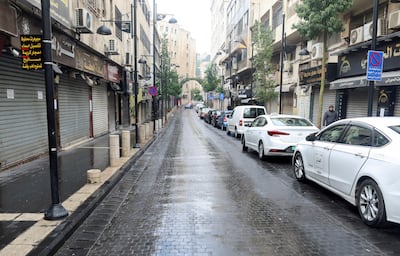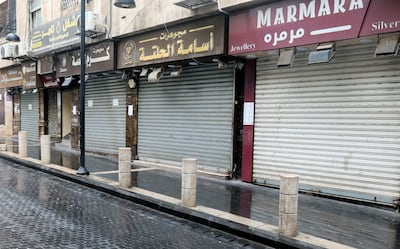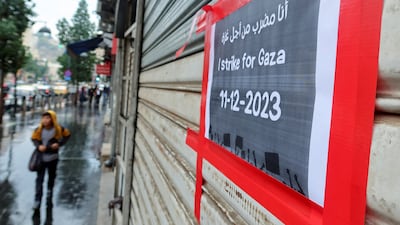Live updates: Follow the latest news on Israel-Gaza
A strike in support of Gaza swept Jordan on Monday, the biggest in decades, underscoring the kingdom's deep-rooted ties with the Palestinian cause.
But the one-day strike found little resonance in other Arab countries.
The National and Islamic Forces, a loose coalition of Palestinian factions in the occupied West Bank and Gaza Strip, had called this week for a global strike in protest at Israel's "genocide" in Gaza. The coalition includes Hamas, the militant group supported by Iran that stormed southern Israel on October 7, leading to the break out of the current war.
Traffic in Amman and other cities across the kingdom was light as most shops and small businesses closed, although many large corporations remained open.
In the Sweifieh retail district, 80 per cent of businesses shut for the day. Among them were mobile phone shops, felafel sellers, money exchangers and two branches of Carrefour, which had been undermined in Jordan by a boycott over perceived French support for Israel.
Another large supermarket, which remained open, was doing swift business.
"People have been coming to us non-stop since morning," the owner said.

Complicated ties
While there is widespread sympathy for the plight of Gaza in Jordan, Hamas's relationship with the authorities have been historically beset by political and security problems, which led to the expulsion of the leadership of the group from Jordan to Syria in 1999.
At the beginning of the current war, Khaled Meshaal, a senior figure in Hamas, struck a raw nerve in Jordan when he suggested in a speech that Jordanian tribes should intervene across the border in Gaza in support of Hamas.
A large proportion of the kingdom's 10 million people are descendants of Palestinians who had fled to the kingdom in 1948 and in 1967, from what is now Israel, and the West Bank and Gaza.
The rest of the population are comprised mostly of tribes who played a main role in the foundation of Jordan as a British protectorate in 1921.
The two segments of society are united in their support for Gaza.
In the run-down Mahata district, a centre for mechanics and spare car parts, most businesses were closed.
"I didn't go to work today but I took orders by phone," said the owner of an auto salvage shop.
One mechanic said he went to his garage because he "cannot stand being at home".
"No customers came anyway," he said.
State broadcaster Al Mamlaka described the strike as "another facet of Jordanian solidarity with the Palestinians".
However, the government-owned Al Rai newspaper described it as a "real threat to the national economy ... probably driven by outside agendas that seek to destabilise Jordan".

Too costly
In Lebanon, the government ordered all public administrations and state-owned enterprises to close on Monday "in solidarity with the Palestinian people" and with southern Lebanon, which has been the scene of intense fighting between Israel and Hezbollah, another Iranian-backed group, aimed at diverting Israel's military capabilities from Gaza.
Banks, schools and universities were observing the strike, while some businesses and public sector organisations were given the choice to participate.
In Beirut, streets were as busy as usual, with most shop owners choosing not to heed the call.
One retailer in Ain El Remmaneh, a mostly Christian neighbourhood, told The National he sympathised with the Palestinians but could not afford to close for the day, amid the country's economic collapse, now in its fifth year.
"What would be the results, just to mark a date and say we were in solidarity?" he said.
Even in the southern, mostly Shiite district of Dahieh, regarded as a Hezbollah stronghold, most restaurants and shops were open.
A waiter said the strike did not apply to the food and beverage sector. Similarly, in the Tayouneh roundabout of Beirut, all shops were open.
"Closing would have been the right decision," said one employee at a gym.
In Tunisia, the country’s powerful and influential union, General Tunisian Labour, did not join calls to honour the strike, severely limiting its impact.
Nouha, a 25 year old who works at a bakery in Soukra, a district north of Tunis, said she has no leeway to strike on her own.
"We had known about it [the call for a global strike] but unfortunately there is nothing we can do,” she said. "If we strike, we get fired."
Shops were open and traffic was normal across Tunis, as well as in Egypt and Iraq.
Marwa, who makes a living by collecting disused plastic in Soukra, said she had not heard about the strike, having chosen to avoid listening to news about Gaza.
"If I had known and if there was a protest, I would have gone,” Marwa said, next to a collection of plastic bottles in front of a supermarket.
"Palestine is very dear to us."

